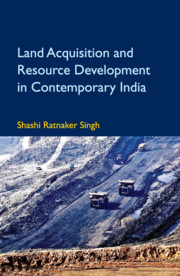Book contents
- Frontmatter
- Contents
- List of Figures
- List of Maps
- List of Tables
- List of Abbreviations
- Foreword
- Acknowledgements
- Part I Theoretical Framework
- 1 Introduction: From Colonial Regime to ‘Welfare State’?
- 2 State, Space and People
- 3 Land, Mines and Minerals
- 4 Land Acquisition and Resource Development in India
- 5 Resource Development and Compensation Issues
- Part II Case Study
- 6 Singrauli: A ‘Space’ of Dependence
- 7 Singrauli: A Development Dilemma
- 8 Administering Singrauli: Governance and Institutions
- 9 Land Acquisition and Its Socio-economic Implications: Field Survey
- Part III Analysis
- 10 Understanding Development
- 11 Conclusion
- Appendix: Memorandum from Mineral-Bearing States
- Bibliography
- Index
3 - Land, Mines and Minerals
Published online by Cambridge University Press: 16 October 2020
- Frontmatter
- Contents
- List of Figures
- List of Maps
- List of Tables
- List of Abbreviations
- Foreword
- Acknowledgements
- Part I Theoretical Framework
- 1 Introduction: From Colonial Regime to ‘Welfare State’?
- 2 State, Space and People
- 3 Land, Mines and Minerals
- 4 Land Acquisition and Resource Development in India
- 5 Resource Development and Compensation Issues
- Part II Case Study
- 6 Singrauli: A ‘Space’ of Dependence
- 7 Singrauli: A Development Dilemma
- 8 Administering Singrauli: Governance and Institutions
- 9 Land Acquisition and Its Socio-economic Implications: Field Survey
- Part III Analysis
- 10 Understanding Development
- 11 Conclusion
- Appendix: Memorandum from Mineral-Bearing States
- Bibliography
- Index
Summary
Land Grab
Over the past few years, large-scale acquisitions of agricultural land in Africa, Asia and Latin America have made headlines in media reports, and there is a growing body of literature on ‘land grab’ across the world. However, dispossession in India and China in the last decade has been primarily for industrial, infrastructure and urbanization purposes, while in Africa and Latin America it is largely for agricultural plantations. The contemporary, global land grab has recently become a key development issue, and there is growing concern that people's connection to their land is being undermined. The term ‘land grab’ generally refers to large-scale cross-border land transactions that are carried out by transnational corporations or initiated by foreign governments. They concern the lease (often for 30–99 years), concession or outright purchase of large areas of land in other countries for various purposes (GRAIN, 2008). However, there is another view which suggests that this is a new phase of capitalist expansion led by ‘private capital’ which is also driving local governments to dispossess and displace peasants from their agricultural land to facilitate the entry of private capital. For instance, special economic zones (SEZs) in India have become centres of protest across India with farmers resisting the state's forcible transfer of their land to the private sector.
The global land grab is to a large extent the result of the liberalization of land markets, which became a major policy goal in the course of the 1990s and has contributed to the commoditization of land and other natural resources (Brenner and Theodore, 2007). Along with the spread of the neoliberal model, and with the support of donors, many governments in Asia, Latin America and Africa started to give more priority to creating dynamic, free and transparent land markets (Deininger, 2003). In a globalizing world, local development is increasingly played out in a matrix of links that enable connections to be made between people and places on a world scale. The intensification of worldwide social relations links such distant localities where local happenings are shaped by events that occur many miles away and vice versa (Giddens, 1990: 64; see also Harvey, 1989).
- Type
- Chapter
- Information
- Publisher: Cambridge University PressPrint publication year: 2021



